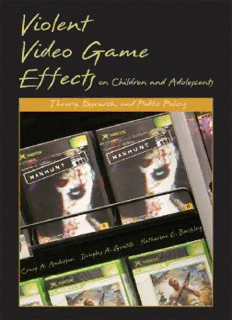
Violent Video Game Effects on Children and Adolescents PDF
Preview Violent Video Game Effects on Children and Adolescents
Violent Video Game Effects on Children and Adolescents This page intentionally left blank VIOLENT VIDEO GAME EFFECTS ON CHILDREN AND ADOLESCENTS Theory, Research, and Public Policy Craig A. Anderson Douglas A. Gentile Katherine E. Buckley 1 2007 3 Oxford University Press, Inc., publishes works that further Oxford University’s objective of excellence in research, scholarship, and education. Oxford New York Auckland Cape Town Dar es Salaam Hong Kong Karachi Kuala Lumpur Madrid Melbourne Mexico City Nairobi New Delhi Shanghai Taipei Toronto With offices in Argentina Austria Brazil Chile Czech Republic France Greece Guatemala Hungary Italy Japan Poland Portugal Singapore South Korea Switzerland Thailand Turkey Ukraine Vietnam Copyright ©2007 by Oxford University Press Published by Oxford University Press, Inc. 198 Madison Avenue, New York, New York 10016 www.oup.com Oxford is a registered trademark of Oxford University Press All rights reserved. No part of this publication may be reproduced, stored in a retrieval system, or transmitted, in any form or by any means, electronic, mechanical, photocopying, recording, or otherwise, without the prior permission of Oxford University Press. Library of Congress Cataloging-in-Publication Data Anderson, Craig Alan, 1952– Violent video game effects on children and adolescents : theory, research, and public policy / by Craig A. Anderson, Douglas A. Gentile, and Katherine E. Buckley. p. cm. Includes bibliographical references and index. ISBN-13 978-0-19-530983-6 ISBN 0-19-530983-9 1. Video games and children. 2. Video games and teenagers. 3. Violence in mass media. 4. Children and violence. 5. Youth and violence. 6. Aggressiveness in children. 7. Aggressiveness in adolescence. I. Gentile, Douglas A., 1964– II. Buckley, Katherine E. III. Title. HQ784.V53A53 2007 302.23′1—dc22 2006016746 9 8 7 6 5 4 3 2 1 Printed in the United States of America on acid-free paper Acknowledgments This work was supported in part by grants from the Centers for Disease Control and Prevention (CDC), the National Institute of Child Health and Human Development (NICHD), and the Laura Jane Musser Foundation (LJMF). Its contents are solely the responsibility of the authors and do not necessarily represent the official views of the CDC, the NICHD, or the LJMF. This work benefited greatly from 10 anonymous peer reviews. We grate- fully thank these individuals for their wonderful suggestions and com- ments. In addition, we thank Jennifer Rappaport, the editorial board at Oxford University Press, and countless colleagues and students who con- tributed in one way or another to this work. This page intentionally left blank Contents Part I. Introduction 1 Violent Video Games: Background and Overview 3 2 Effects of Exposure to Violent Entertainment Media 12 3 The General Aggression Model 40 Part II. New Studies 4 Study 1: Experimental Study of Violent Video Games With Elementary School and College Students 61 5 Study 2: Correlational Study With High School Students 78 6 Study 3: Longitudinal Study With Elementary School Students 95 7 Risk Factor Illustrations 120 viii Contents Part III. General Discussion (What Does It All Mean?) 8 New Findings and Their Implications 133 9 Interpretations and Public Policy 142 10 Reducing Violent Video Game Effects 160 Appendix 1: Best Practices Coding 165 Appendix 2: Video Game Ratings 167 References 173 Index 187 PART I INTRODUCTION In Part I we describe the basic issues concerning violent video games, past re- search, and our theoretical approach. Chapter 1 presents a brief history of vio- lent video games, youth exposure to such games, and an overview of things to come. Chapter 2 lays out a host of conceptual viewpoints involving defini- tions, methodologies, and guiding principles. It then provides a brief review of prior media violence research, with a special emphasis on research involving the effects of violent video games. Chapter 3 presents the General Aggression Model in somewhat more detail, and shows how that model can be used to un- derstand developmental processes and a risk and resilience approach to human aggression. It concludes with a section on how the General Aggression Model can be used to understand and predict effects of media violence on the devel- opment of aggressive behavior and aggressive personality.
Description: